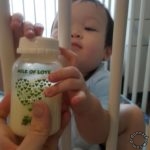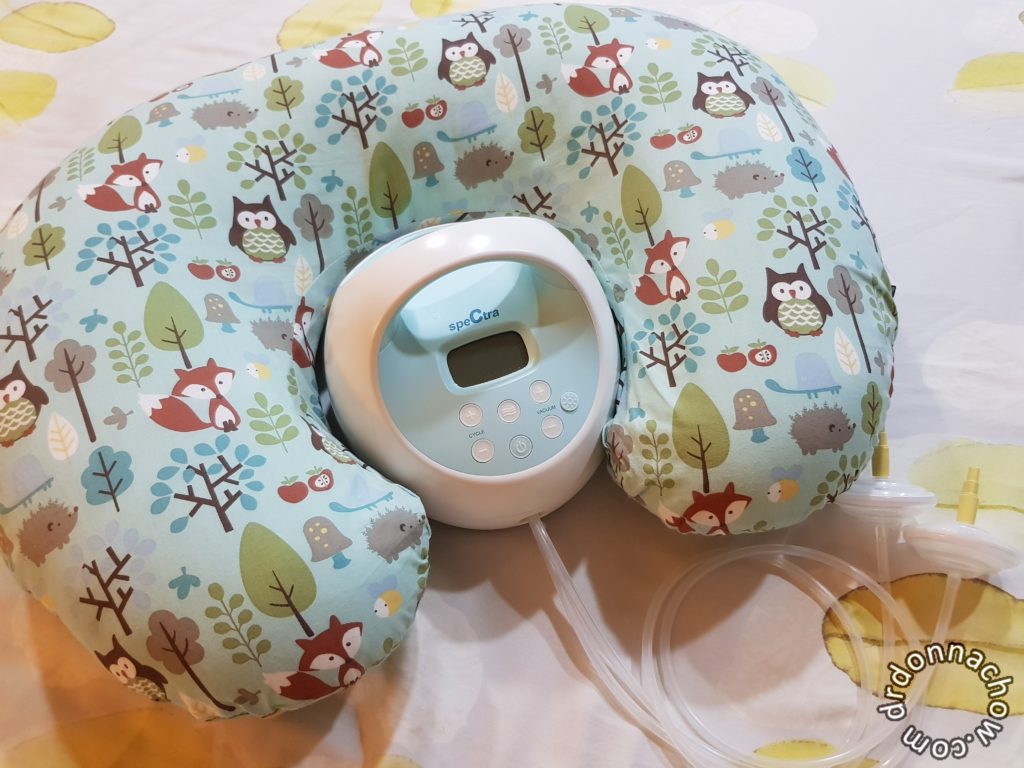
My trusty Spectra S1 and Boppy nursing pillow
When my first son was born, my milk supply was extremely low and I struggled to pump breast milk for him. Breast feeding does not come naturally to me. Not everyone is blessed with abundant breast milk supply and has surplus milk to store in the freezer. As a friend puts in aptly; God has created man (and woman) unequally for a reason. He blesses us with different abilities so that each of us can achieve different things in life.
As a first time mum, I have always assumed that latching a baby is a natural instinct, and pumping breast milk is fairly straight forward. I attended antenatal classes regularly throughout my first pregnancy and came to know about this idea that we shouldn’t bottle feed my baby in his early days to reduce the risk of “nipple confusion”. When I finally delivered my child, everything went hay-wired. Suddenly I realise my milk supply is low and baby refuses to latch because the flow is very slow. I persisted for 5 days; continuing to latch him and at the same time supplement formula milk with a spoon. His fluid intake became very poor and was eventually admitted to the hospital for acute fever and dehydration in the first week of his life.
I still recall the moment when we pulled up in the hospital carpark as I carried his limp and lifeless body to the 24 hour clinic. What did I do? Did I kill my own child because I insisted to latch him and refuse to let him drink from a bottle?
Thankfully, my baby recovered from his dehydration but everything else took a nose dive for me. I saw several lactation nurses who tried to help me latch my baby but each visit was met with a terrible failure. Baby was so used to the bottle; we felt it meaningless to push him to latch when all he could drink were drops of breast milk. There was no other way except to accept my fate of an “exclusive pumping” mum. Unfortunately, my low milk supply (approx 200-250ml/day) did not spare me from developing 2 episodes of mastitis, with one progressing to a breast abscess and required fine needle drainage at the clinic.
My supply remained low and I continued pumping milk for another 18 months. That was in 2015.
So for my second child, I wise up.
This time, I have chosen to deliver in another hospital which gave me better lactation support. I know the basics of pumping breast milk from my previous experience. But I continue struggling to meet the demands of my second boy, who was born a heavy weight of 4.33 kg. He will latch for hours, and still cry for milk at the end of it. The initial days were tough. I just sat there looking at my Spectra breast pump and nursing pillow; wondering if I should latch or pump. If I latch every 3 hours, I wouldn’t have time to pump. It is a gamble between the baby or the pump.
Latching didn’t work out in the end. Not all babies can latch well – it is a learned behaviour which takes time to master. And I am afraid that if I don’t start pumping out milk, my supply will just continue to drop with each passing day.
My paediatrician is already concerned when he is not drinking enough from the breast and not putting on weight as he should be. Why insist to latch? He asked me.
So from the first week onwards, I started pumping religiously. And my persistence paid off – my supply went up from the usual 200 ml a day in the first week to my current yield of more than 800 ml a day.
I am thankful that I am able to feed my baby with an increased supply, compared to his older brother.
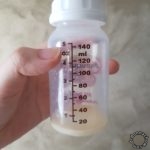 First week of pump = 20 ml per pump |
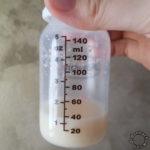 Increase to 40 ml per pump |
|---|---|
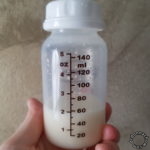 Increase to 60 ml per pump |
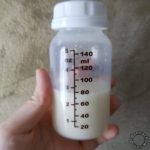 Increase to 80 ml per pump |
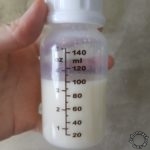 Increase to 100 ml per pump |
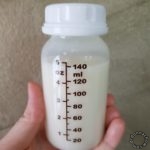 140 ml per pump on the good days |
I am happy to have found some success with increasing my breast milk yield. And here is what I did;
(1) Power pump every day.
Power pump is not a mystery. It is a series of short consecutive pumps to simulate the feeding pattern of a hungry baby. It works well for mothers with a low yield to stimulate multiple let-downs of milk. The idea is to pump 20 min, rest 10 min, pump another 10 min, rest another 10 min and pump another 10 min again. The whole cycle takes 60 min to complete. So instead a long continous pump of 30 min, try to power pump (20, 10, 10) to increase yield. The more milk you remove from your breasts, the more milk will be produced for your next pump.
(2) Pump regularly
Pumping once or twice a day is not likely to increase your yield. This article points out that in the early months post delivery, your hormones play a big role in stimulating your body to produce breast milk. The subsequent months that follow, it is the process of milk removal that is responsible for conditioning your body to continue milk production. And the capacity of the breasts are likened to the size of a cup. Some ladies have breasts with bigger capacity to store more milk while others have smaller capacity. And once your cups are filled to the brim with milk, they are unlikely to produce more. This means that you need to effectively empty your breasts at regular intervals so that your body gets the signal to produce more.
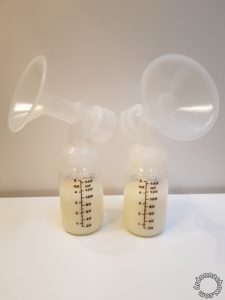
A good morning yield
(3) Invest in a good quality breast milk pump and use correct flange sizes
You may have heard that some breast pumps work better for others. And a silent motor is a life-saver when you pump at night. In my case, the Spectra S1 breast pump was excellent for me. Get expert help if you do not know how to pump. And use correct flange sizes so as to minimise unnecessary abrasion and pain to the nipples when you pump.
(4) Massage before and during every single pump
Massage, massage and keep massaging. It helps the milk to let down faster and reduces clogged ducts. The more I massage, the better the milk flow. And to massage better, I use earth mama organic nipple butter (no need to rinse off before pumping or breastfeeding for this one). I have tried other nipple creams but most are too sticky or leaves an oily residue. During massaging, it is a great opportunity to check for clogged ducts and intervene early if you find any. At the end of each pump, it is also a good habit to hand express out any remaining drops of breast milk. You will get more milk from a combination of massage, pump and hand express.
(5) Finding my milk booster
Galactogogues is a mouthful term for “milk booster”. Often these are common foods which can be found in our daily diet. Common ones include fenugreek, flax seeds, blessed thistle, oatmeal, brewer’s yeast etc. Lactation tea and cookies often contain either one or a combination of these. Some mothers take prescription medicine such as domperidone to increase their milk supply. A few reported raw salmon, chocolates and even durian help them boost their supply. However, each individual responds to these boosters differently, and you will need to experiment to see which ones work well for you.
(6) Drink to thirst
There is a common myth that drinking more fluids increase your milk supply. Unfortunately, no strong evidence is present to show that this is the case. Overhydration can lead to water intoxication and electrolyte imbalance which is potentially fatal. I have tried once to increase my fluid intake and to my dismay, most of the fluids were directed to the bladder instead of the breasts. Fluid requirement is based on your body weight and activity level. You may have heard the recommendation of drinking an average of at least 8 cups of water a day. A nursing mum should drink another 4 cups, making it 12 cups a day. This works out to be around 3 litres a day. When in doubt, drink to thirst.
Contrary to popular belief, breast milk does not come free. The amount of money spent on consulting lactation nurses, breast massages to relieve clogged ducts, eating milk boosters, buying a quality breast pump and pump parts come up to a nifty figure which easily towers above the price of formula milk.
Latching a baby does not necessarily produce more breast milk for all mothers. Some babies are just unable to latch well despite the best efforts. They may have lip or tongue ties which require surgical correction to improve their latch. If you encounter any nurse telling you to keep latching and not to feed bottle to your baby, please run away. Before your breasts start to make enough milk, your baby is going to suffer the effects of dehydration which can be fatal in some instances. It is ok to supplement with formula milk. Cow’s milk is not poison.
And with each pregnancy, your body will generate more milk glands to produce breast milk. If you are unable to produce enough breast milk for your first baby, do not despair. It is likely that you will be more successful in your subsequent pregnancies. We all learn from mistakes and failures. It doesn’t make you any less of a mother if you are unable to produce breast milk.
There is too much societal hype for mothers to believe that breast is best. Without a doubt, breast milk contains all the nutrients your baby needs during his initial months of his life. However, it does not create super babies who doesn’t fall sick, get top marks in class or other miracles we often dream about.
I believe fed is best.

Enjoying breast milk from a bottle


